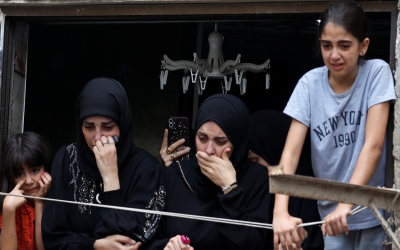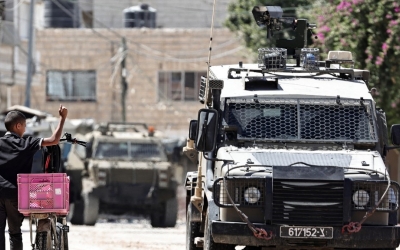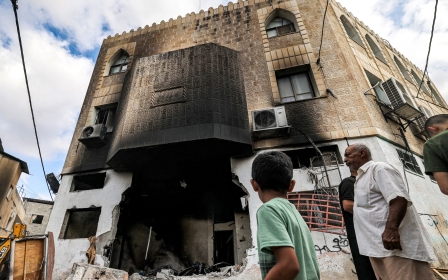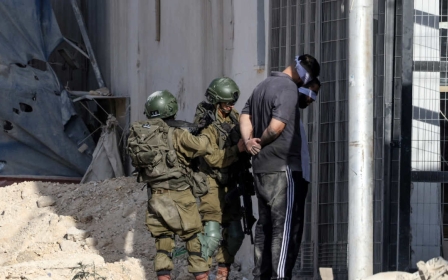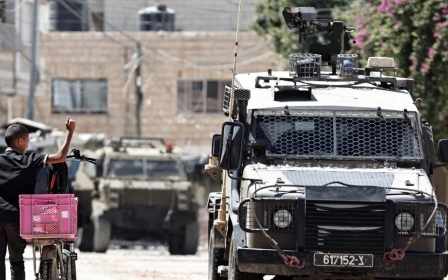West Bank: Communications cut in Jenin as Israeli assault enters second day
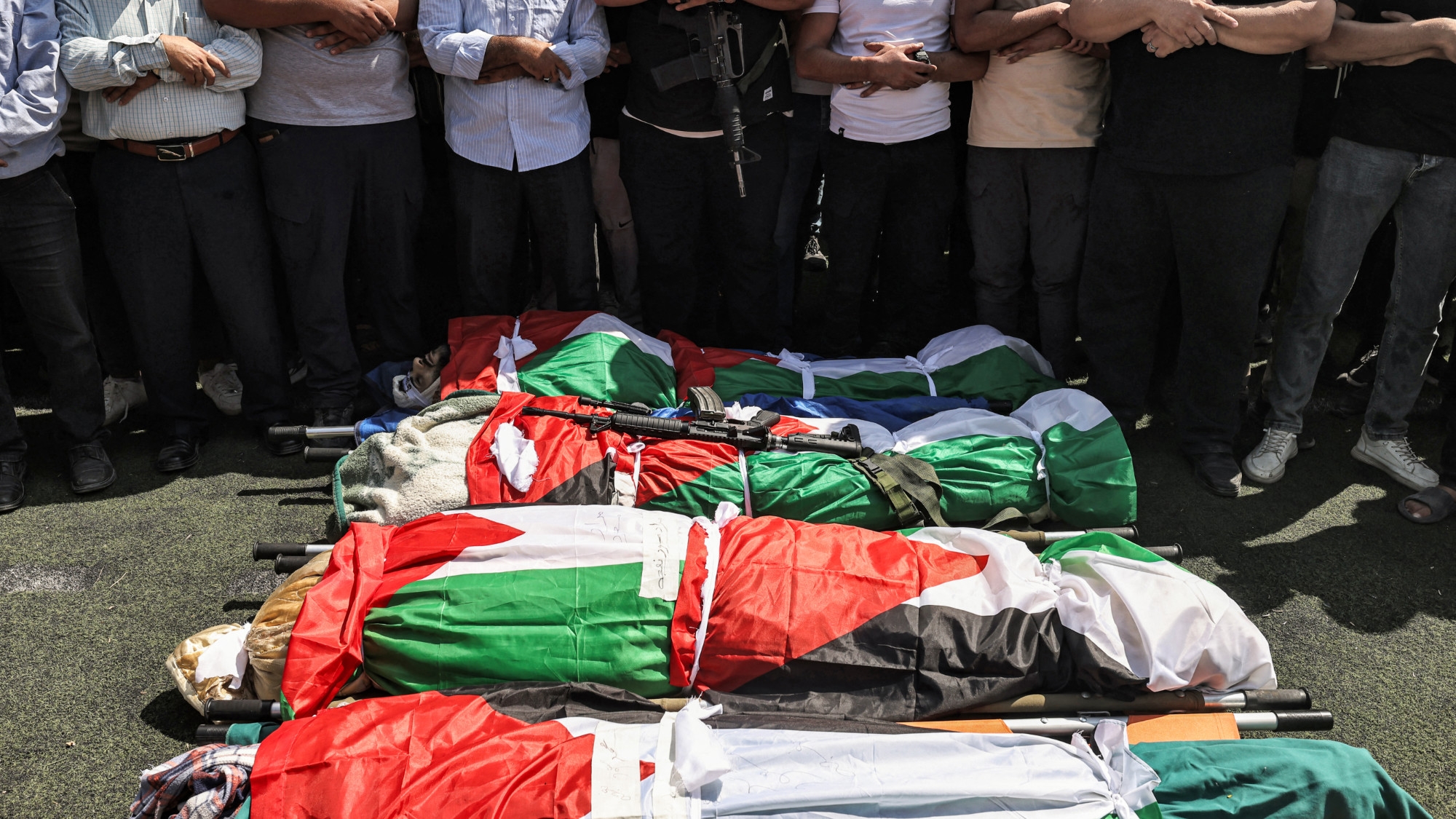
Internet and landline services were cut in Jenin on Thursday as Israel's largest operation in the occupied West Bank in more than two decades entered a second day.
Israeli bulldozers ploughed into critical infrastructure, cutting off communications in the city, the Palestinian Telecommunications Network said. Electricity and water lines have also been damaged.
Paramedics report that they are repeatedly losing contact as a result of interference on their channels, with Israeli military vehicles delaying medical teams from reaching hospitals.
The offensive began early on Wednesday morning with attacks from land and air on Jenin and two other cities in the north of the occupied West Bank - Tulkarm and Tubas.
The Israeli military on Thursday said it had assassinated and taken the bodies of five Palestinians, including top Islamic Jihad commander Muhammad Jaber in Tulkarm, bringing the death toll from the assault to 18.
New MEE newsletter: Jerusalem Dispatch
Sign up to get the latest insights and analysis on Israel-Palestine, alongside Turkey Unpacked and other MEE newsletters
Among those killed was Muhammad al-Orabi, a young man from Jenin whose two brothers were killed in previous raids.
Israeli soldiers shot Orabi near his home in the Old City, Palestinian medical sources said on Thursday.
Journalist Ali Samoudi, who lives in Jenin, said Orabi did not pose a threat to soldiers when he was shot, adding that Israeli snipers stationed across the city "shoot at any moving object".
"My house is in the eastern neighbourhood and there is a sniper stationed opposite it, which prevented me from leaving the house for several hours because orders are given to them to shoot at anyone," he told Middle East Eye.
'The raids on homes are brutal'
- Nihad al-Shawish, head of Nour Shams camp's popular committee
According to Samoudi, Israeli military vehicles continue to besiege Jenin Governmental Hospital, obstructing medical teams from reaching the facility while they conduct inspections.
Residents in Jenin could hear armed clashes and the detonation of explosive devices targeting Israeli military vehicles intermittenly on Thursday.
"From the first moments of the Israeli invasion, the electricity was cut off. We have been without electricity and water for 48 hours," a Jenin resident, who did not want to give their name, told MEE.
"The situation is really, really bad. Food in our refrigerators has gone bad so we are forced to leave Jenin and take shelter with relatives outside the city."
The resident said there was no internet or even the ability to charge phones. "It feels like Gaza's conditions," the resident said.
Residents crammed in homes
In Tulkarm, residents in the Nour Shams camp said they were unable to move on Thursday, subject to a tight Israeli army siege which has seen the area sealed as violent raids continued on homes.
Nihad al-Shawish, head of the camp's popular committee, said the offensive "is very ferocious".
“The raids on homes are brutal and are carried out accompanied by police dogs that don’t hesitate to attack citizens," he told MEE.
"Young men are also detained after being taken to several buildings inside the camp, tied up, blindfolded, and subjected to field interrogation," he said.
"People are crammed into their homes and we hear the sounds of gunfire from time to time amid continuing incursions into dozens of homes and terrorising their residents,” he explained.
Israeli bulldozers in the area were ripping up streets, cutting off water to the entire camp, local reports said.
Shawish said Israeli media reports were spreading rumours that the army has asked residents to leave voluntarily. The reports were the only time he said has heard such "evacuation" discussed.
Fire spreads in camp
The siege on the Nour Shams camp included the Al-Manshiya neighbourhood where Israeli soldiers prevented the transfer of the body of a Palestinian with special needs killed by the Israeli army on Wednesday evening.
On Thursday afternoon, the Israeli army blew up a house in the neighbourhood, starting a fire that spread to nearby homes.
Ayman Kanouh, the owner of the house, told MEE that Israeli soldiers prevented fire crews from reaching the neighbourhood to extinguish the blaze. He feared the fire could get worse if it reached gas pipes in the basement.
There were dozens of cases of Palestinians suffering from smoke inhalation, he said. The Israeli army also fired sound bombs at anyone trying to approach the burning house.
“We left the house a few hours before it was stormed, but the houses in the neighbourhood are close together, which led to the fire spreading,” he said.
The affected homes were “inhabited by the elderly and sick”, but Israeli troops were “still preventing us from going there,” Kanouh added.
“Diabetics need medication, and elderly people are suffering from smoke inhalation. Soldiers prevented them from leaving their homes, which are in danger of burning,” Kanouh said.
Meanwhile, in the city of Tubas, funerals were held on Thursday for four people killed in the offensive after the Israeli army withdrew from al-Far'a camp after storming it for 24 hours.
Middle East Eye delivers independent and unrivalled coverage and analysis of the Middle East, North Africa and beyond. To learn more about republishing this content and the associated fees, please fill out this form. More about MEE can be found here.


